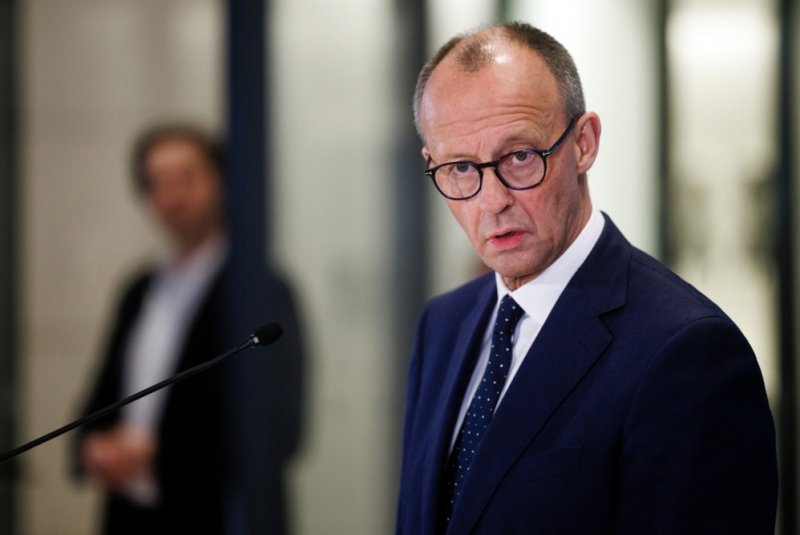Chairman of the Christian Democratic Union (CDU) party and faction, Friedrich Merz, delivers a statement at the German parliament ‘Bundestag’ in Berlin, Germany, in January. Merz was elected Germany’s next chancellor Sunday. Photo by Clemens Bilan/EPA-EFE
Feb. 23 (UPI) — Millions of Germans are deciding the next chancellor in snap elections Sunday with the center-right Christian Democratic Union party widely projected to win and its candidate Friedrich Merz installed as the top official.
“We fought a tough election campaign about important topics … now we will talk to each other. We must be able to act quickly,” Merz said. While the CDU is celebrating its victory, the result was split three ways and won with less than 30% of the vote, according to the German elections website.
The party of Chancellor Olaf Scholz finished in third place with 16.2% of the votes, its worst showing at the polls in more than a decade, and presages a decidedly more conservative trend in the country.
While far more conservative than the current administration, the CDU is more moderate than the far-right Alternative for Germany party, which garnered 20.2% of the vote — which performed twice as well as the last election four years ago.
Germany, which boasts Europe’s largest and most robust economy, and its decisive vote for the CDU mirrors an international shift toward the social and political right on the continent and in the United States where Donald Trump won decisively in the 2024 elections, a move away from a more liberal Biden administration.
“Looks like the conservative party in Germany has won the very big and highly anticipated election. Much like the U.S.A., the people of Germany got tired of the no common sense agenda, especially on energy and Immigration, that has prevailed for some many years,” Trump posted on his social media channel after the election results were announced.
AfD party chair Alice Weidel, a Trump backer and supporter, said in the runup to the German election that the “AfD is the is indeed the one and only alternative for our country; our very last option,” in a social media post. Other AfD leaders predict more future success.
“We see that the upcoming generation in Germany is voting often for the AfD, because this generation is directly confronted with the big problems of our society — migration problems, migration dynamics,” party member Hannes Gnauck said, according to CNN.
“They are also confronted with the economy. Therefore so many young people are choosing the AfD.”
Tesla and SpaceX chief executive Elon Musk, a Republican political neophyte, also took to social media to express support for Germany’s conservative parties.
“AfD!” Musk posted on X, bordered on either side with three German flag emojis.
The AfD’s performance in the election is drawing praise from other conservative leaders, including French TV pundit Éric Zemmour, who has been cited for incidents of hate speech on multiple occasions.
Zemmour ran for president in 2022 on a campaign promise to “save France” from Islam.
This was the highest turnout for a German election since reunification in 1990. Polling organizations put the number as high as 84%.
Germany’s move to the right reflects the conservative shift taking place in other nations, as well.
The Freedom Party of Austria won 28.8% of the vote in the country’s 2024 legislative elections, the best result in the party’s history.
Geert Wilders, a right-leaning politician in The Netherlands, led his Party for Freedom to a major victory in the 2023 Dutch general election. PVV won 37 seats in the 150-seat House of Representatives.
In Italy’s 2022 election, Prime Minister Giorgia Meloni’s Brothers of Italy party won 26% of the vote, giving Italy its most right-leaning administration since the reign of the fascist dictator Benito Mussolini.
Greece also made a recent shift in its political landscape. A far-right nationalist party, the Spartans, claimed 4.5% of the vote and dozen seats in the Hellenic Parliament in 2023 elections.
